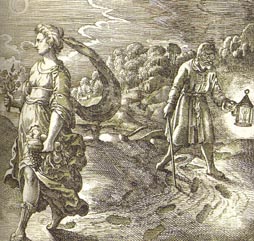About Alchemy

Alchemy – the art of transmuting impure metals into precious gold, or of transforming demons into angels, or of manufacturing the elixir of life – has since time immemorial inspired mankind to look beyond the surface of existence and reveal hidden patterns that influence and make up the matrix of the world that we know. Throughout history, alchemy has both been considered to be the art of God, only to be revealed unto a small elite, and something that charlatans and ‘puffers’ use to confuse and fool the weak hearted. In the latter sense, it has been degraded by both its performers and its opponents, whereas the former have protected their secrets from the profane.
The alchemical archetypes are indeed a coded language to the profane eye, but with the aid of the keys of Wisdom they are able to increase one’s knowledge about the individual and collective Self, the matrix of reality, as well as the Cosmos as a whole. The alchemist refines the impure into the pure and finally weaves together the opposites of the Universe to a golden wholeness in the alchemical wedding. Thus, the alchemist’s Magnum Opus (Great Work) is a process wherein one seeks to liberate the confined spirit from the dark matter, in order that the spirit may be reunited with matter which, after much hard work, has been refined.
Today, alchemy can roughly be divided into three different branches: the laboratorial aspect, the psychological aspect, and the uniting spiritual aspect, the Royal Path, that utilizes knowledge and wisdom of both the former as well as spiritual practices. Various aspects of laboratorial and spiritual alchemy have been utilized by scientists, philosophers, free masons, artists and authors, and the art is thus very much alive, albeit far from understood.
The alchemists’ symbolic language speaks to the deepest parts of our subconscious and superconscious, and points out how the uniting of opposites – masculine and feminine, intellect and feeling, spirit and matter – can be accomplished both within and without. Such work can, to the highest degree, give rise to the transformation of the soul towards wholeness, which involves experiences of a physical, emotional, intellectual and spiritual character.


